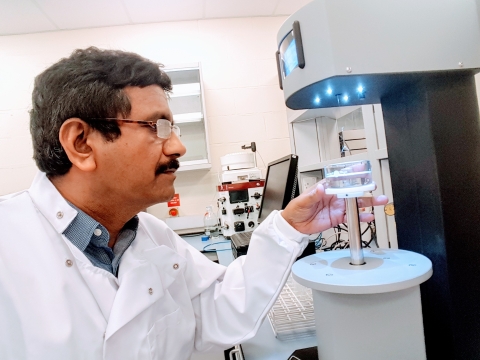
Scientists suggest the Covid-19 virus could be tracked through a closer watch on sewage systems worldwide.
The virus has been detected in the faeces of patients with coronavirus in the Netherlands, USA, France and Australia.
Dr Pattanathu Rahman, a microbiologist at the University of Portsmouth and Director of TeeGene and colleagues at Bharathiar University, India argue that monitoring of wastewater for the coronavirus is the next step.
The results could give health authorities advance warning of further outbreaks.
Their research is published in Current Opinion in Environmental Science & Health.
Dr Rahman said: “Despite the advancements being made in medicine and research, it is proving difficult to contain this virus.
It’s critical we locate the hotspots of the disease and begin isolation and treatment from there.
Dr Pattanathu Rahman, Microbiologist
“It’s highly likely that the virus, SARS-CoV-2, survives in wastewater, so we looked at using nanofiber filters as a wastewater pre-treatment routine and the upgrade of existing wastewater evaluation and treatment systems to serve as a surveillance tool.
“It’s nearly impossible to test every individual in a pandemic, so it’s critical we locate the hotspots of the disease and begin isolation and treatment from there.”
Environmental monitoring has previously been used to track and help eliminate viruses including poliovirus and aichivirus.
Being able to monitor effectively depends on a wide range of factors, including sanitary and climatic conditions, sampling methods, rainfall and filters. Assuming a wastewater treatment station anywhere in the world could be regularly monitored, the major shortcoming of such testing is individuals couldn’t be identified and a positive result would merely indicate that the virus was active in a particular population.
There is significant risk the virus can be transmitted through sewage
Dr Pattanathu Rahman, Microbiologist
Dr Rahman said: “Water treatment systems play a significant role in public health protection.
“Treated wastewater has a wide range of uses from drinking water, to being used for irrigation and food production. There is significant risk the virus can be transmitted through sewage and it’s possible slimy bacteria that forms a thin coat over sewage pipelines could help spread of the virus.”
Dr Rahman has a second study with colleagues at the Centre for Enzyme Innovation on the use of biosurfactants in fighting Covid-19 published in Frontiers in Microbiology Journal.
He said: ''The use of biosurfactants in dealing with this pandemic justifies extensive study with their potential applications being in the prevention of viral spread; dealing with the symptoms that develop after the incubation period; directly targeting viral infected cells and preventing the spread of the virus throughout the host, all in addition to acting as potential drug delivery systems and cleaning agents'.
The UK Parliament knowledge exchange unit has acknowledged Dr Rahman’s contributions in mitigating Covid-19 pandemic.
